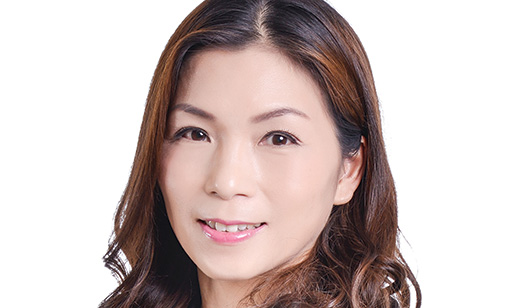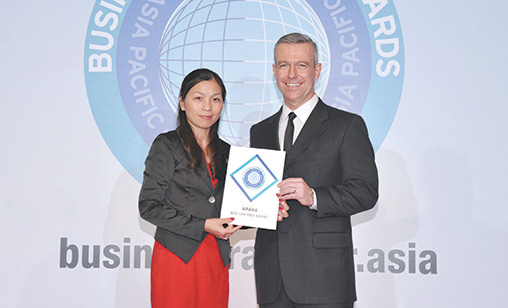Executive Interview
Right place, right time
AirAsia has celebrated its 13th anniversary in Macau and appointed Celia Lao as AirAsia CEO for Hong Kong and Macau.
October 1st 2017
It all started in 2002 after Fernandes had bought loss-making AirAsia for one Malyasian ringgit (US$0.23) with the intention of bringing low-cost flying to the Asia-Pacific in 2001. Read More » Lao, then a young marketing manager of the six-year old – and struggling – Macau International Airport, met the Malaysian entrepreneur.
Lao was selling Macau and Fernandes asked if she could offer AirAsia a good deal to begin flying to the gambling enclave. “I was attending many international route conferences back then and nobody knew where Macau was. I needed to sell Macau first before selling the airport,” she said.
 |
| 'AirAsia flies to 15 destinations in the Mainland. The group is one of Airbus’ best customers with its order of 174 A320ceo, 304 A320neo, 100 A321neo as well as 20 A330-300s, 66 A330neo and 10 A350-900s for its long-haul AirAsia X carriers' |
Macau International Airport had opened in 1996, when Macau was a Portuguese colony. It was largely a vanity project that had became close to a white elephant airport in the Pearl River Delta. In the first three years of its operation, before Macau was returned to Mainland China, TAP Portugal flew one stop Macau-Bangkok-Lisbon A340 services twice weekly between the two cities.
TAP terminated the service in the lead up to Macau’s handover to China in 1999. “In 2002, Macau was still a white elephant airport,” said Lao. “At that time, because Taiwanese airlines could not fly directly to China, they would make a technical stop in Macau and then fly onto China,” she said.
But gradually, from 2004, as the door opened to cross strait flights between the Mainland and Taiwan, Macau airport welcomed low-cost carriers to fill the revenue gap left by the departing Taiwan carriers.
“Macau airport made the right decision at the right time, otherwise it might still be a white elephant airport,” said Lao. “Our (AirAsia) LCC traffic supplemented the loss of Taiwan traffic at the right time. “AirAsia helped put Macau on the map. People around the world, especially in the Asia-Pacific, started to know Macau once AirAsia operated there.”
By this time, in 2004, Lao had moved to AirAsia, where she was the first person to be employed by the LCC in Hong Kong and Macau. Since then, she has risen through the ranks and is now CEO for the AirAsia group for Hong Kong and Macau. Her responsibilities include business development, route planning and government relations.
“Tony [Fernandes] always says I grew together with AirAsia. When I joined the airline, I was single. Now I have three kids,” Lao told Orient Aviation from Macau.
“I took care of expansion in China. I set up Macau in 2004 and then Xiamen in 2005. At the time there were no low-cost carriers in China. Spring [Airlines] had not started. Low-cost airlines book everything online. In 2005 nobody had smartphones or credit cards. To be honest, it was very difficult in those early days,” she said.
“But we were lucky because we went into China early. Our Mainland network is huge now. And you can see we managed to acquire some very good slots in key cities like Guangzhou and Shenzhen,” she said, but added that unfortunately those days were over.
Lao said AirAsia’s growth in Hong Kong is curtailed by acute slot shortages at its airport (HKIA) and will remain so until the third runway opens in 2023.
“In Hong Kong, we cannot open any routes. It is very constrained. The third runway will still take a very long time to finish. The Hong Kong Civil Aviation Department (HKCAD) encourages us to swap our A320s for A330s on flights to Kuala Lumpur and Bangkok to maximize the value of our slots,” she said.
“We applied to fly to Jakarta, but we could not get the slots. We have applied many times, but still no Jakarta because the HKCAD gives preference to new destinations,” she said.
 |
AirAsia is not looking to form a joint venture in Hong Kong. “Remember what happened to Jetstar in Hong Kong. Already, we have signed Memorandums of Understanding (MoU) in China, Vietnam and Cambodia,” she said.
“Resources also are becoming very limited in China. No slots are available even in second and third tier cities. It is the reason we are focusing more closely on Macau as a base for regional flights.”
“Long-haul from Macau will come at a later stage. We must start more regional routes first, but it is definitely a possibility. Macau has open skies and many fifth freedom rights available. Between Malaysia and Macau and Thailand and Macau it’s fully open. We could easily do, for example, Kuala Lumpur-Macau-Vancouver with an A330. This is something for the future.”
AirAsia has double daily flights from Macau to each of its bases in Kuala Lumpur and Bangkok’s Don Mueang airport. It also flies to Chiang Mai and U-Tapao. Recently, it inaugurated a three times weekly service from Macau to Jakarta, its third hub.
The airline group aimed to be a low-cost network carrier by channelling traffic through its hubs to feeder flights across Southeast Asia and also long-haul to Europe, Hawaii and Australia.
In Macau and Hong Kong, Lao is banking heavily on Mainland cross-border traffic for growth. In late August, AirAsia began partnering with Express Link, a new bus service that shuttles passengers from the Mainland border to Macau Airport. It is similar to the ferry services operated from several of China’s Pearl River Delta ports to Hong Kong International Airport.
Lao hoped passenger volumes would increase by 20%-50% after the service has been established. “More than 80% of our clients are individual tourists,” said Lao. “Therefore, the launch of the shuttle would greatly impact our [value proposition to] individual tourists.” Approximately 30% of AirAsia customers in Hong Kong and Macau are tourists from the Mainland, she said.
“Different routes have different conditions. For example, 50% of Chinese tourists take the flight to Bangkok, but there are fewer for Kuala Lumpur because more Malaysians visit Macau,” she said.
Flights from Macau to Southeast Asia’s island resorts were under consideration, with Macau-Phuket most possibly the next route to be announced.
The 24-hour border crossing facilities between Macau and the Mainland as well as the completion of the Hong Kong-Zhuhai-Macau Bridge would improve Macau airport’s market proposition, she said.
“Mainland travellers can exit from Macau and return home via Hong Kong so they can visit both Special Administrative Regions (SAR),” she said.
AirAsia Group’s biggest opportunity yet will be on the Mainland. In May, the group signed an MoU with two Mainland partners to establish AirAsia China, a low-cost carrier to be based in Zhengzhou, the capital of Henan province.
The Chinese partners are the China Everbright Group, a conglomerate with a major shareholding in the Hong Kong-headquartered China Aircraft Leasing Group (CALC), and a state-controlled think tank, Henan Government Working Group.
At press time, it had added two Japanese investors to the venture. The parties have agreed, in addition to setting up the LCC, to invest in a dedicated low-cost terminal at Zhengzhou Airport, a MRO facility and an aviation academy to train pilots, engineers and cabin crew.
The AirAsia China investors believe Zhengzhou will become more important as China’s ‘One Belt, One Road’ policy becomes a physical fact. Zhengzhou is one of China’s key logistical hubs, with many of the world’s largest cargo airlines offering scheduled services into Zhengzhou. Cargolux is in the process of establishing Cargolux China in Zhengzhou.
Greg Thomson says:
October 24th 2017 04:05pm